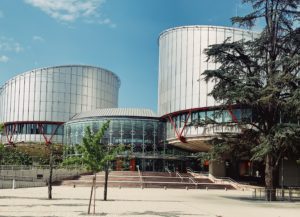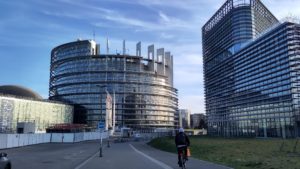The Council of Europe and the Human Right to a Clean, Healthy and Sustainable Environment
EUROPARC advocates for the implementation of the Human Right to a Clean, Healthy and Sustainable Environment and also the Rights of Nature. Below you can read an update of the progress incorporating this into the European legal system.
The Council of Europe and the Human Right to a Clean, Healthy and Sustainable Environment
The Council of Europe (CoE) is an international organisation of all European countries (EU and non-EU, but recently excluding Russia for obvious reasons) to promote democracy and inclusion, human rights, and the rule of law. EUROPARC is actively engaged in this space, advocating for the priorities of Protected Areas across all of Europe.
Last year we published an update on the progress in the United Nations space on acknowledging the right to a clean, healthy and sustainable environment as a human right. The follow up of this decision is for it to be incorporated into national and regional jurisdiction before it can be used as a tool to hold entities accountable for their environmental damage through actions or inactions. Within Europe, there are countries which have or are making progress to incorporate this human right into their constitutions or national law. During an event at the European Centre for Youth in Strasbourg, three speakers presented the progress on the legal aspects on implementing and enforcing the protection and conservation of nature including climate action at the regional level within the Council of Europe.

The European Court of Human Rights by Zsófia Vera
The first speaker was Nataliy Kobylarz, a senior lawyer at the Registry of the European Court of Human Rights (ECtHR) and a lecturer on European Human Rights. She presented the progress and challenges of implementing this human right into the ECtHR – which is an international legally binding court to which individuals can bring cases against one or more states.
While in Africa people are guaranteed the right to ‘a general satisfactory environment favourable to their development’ through the African Charter on Human and People’s Rights, and similarly the Inter-American Court of Human Rights recognises the protection of the right to a healthy environment through the American Convention on Human Rights, the European Court of Human Rights is still a few years from the same. This is because it only covers civil and political rights and not cultural and social rights (sometimes called second generation rights and are not enforced by the ECtHR but a smaller committee with less power) which is where the African and American courts drew their argument from.
Currently, to bring a case to the European Court of Human Rights, there has to be a clear event that creates a “victim”. Secondly there needs to be a clear argument that this case could not be solved at a national level. Of six recent cases brought to the ECtHR only three have not been dismissed because of these two previously mentioned conditions. The three that will be seen in court are:
- #Klimaseniorinnen: a group of >64 year olds who are taking Switzerland to court for not doing enough to prevent the heatwaves, which cause health problems in elderly women in particular. This case has been in the works for over 20 years already with more than 45 000 deaths attributed to heatwaves in Europe.
- Carême v. France: a case where a former lawyer is fighting for the “right to a normal private and family life”, which is at risk due to France’s inadequate climate action. Damien Carême, former mayor of the Commune of Grande Synthe in France, had previously had his case seen in the French Court but they dismissed the individual aspect of it and it has now been brought to the ECtHR.
- Duarte Agostinho and Others v. Portugal and 32 Other States: This is also known as the case of the six Portuguese children, which is based on the rights to life, to privacy (which includes mental and physical well-being) and the right not to experience discrimination. This case has been sent to the Grand Chamber.
The first two cases will be seen in the Grand Chamber on the 29th of March and the third is still unknown. All of these are based on previous human rights and having a clear recognition of the human right to a clean, healthy and sustainable environment would be a huge step forward to having environmental cases heard in the ECtHR.
Another legal tool is the Rights of Nature, which have been adopted in a few countries such as New Zealand, Ecuador and Pakistan. This would be a more eco-centric way of using the law to protect the environment than the human right, which always requires a human to be involved. The Rights of Nature would give legal personhood either to Mother Nature, to an ecosystem/feature (such as a river) and they would be represented in court by an ombudsman. However, in the current scope, it does not seem possible for the European Court of Human Rights to include the Rights of Nature into its procedures.
Secondly, David Milner, head of the Steering Committee for Human Rights (CDDH) at the Council of Europe, shared the work that has been done so far. In the 2021 manual, the latest edition from the CDDH, it states that:
The Committee of Ministers recommends that the governments of the member States reflect on the nature, content and implications of the right to a clean, healthy and sustainable environment and on that basis, actively consider recognising it at the national level
This doesn’t actually require them to recognise the human right but only to “reflect on the nature, content and implications” because there is no agreed definition of how the right will be implemented. While it may seem discouraging, he went on to share that change in the hard laws with obligations were often preceded by soft laws such as in recommendations, and that the Council of Europe was at the “soft law stage” but actively considering the next stage. Currently there is a feasibility study to be completed in 2024, which will look at many aspects of the implementation of a possible hard law on the right to a clean, healthy and sustainable environment.
One of the “soft law” approaches is by using the Bern Convention and the Landscapes Convention, which protect natural areas and landscapes across Europe for their inherent value as well as their benefits to us. The last speaker, Gianluca Silvestrini, head of the Biodiversity Division of the Council of Europe explained how the Bern Convention uses the soft law approach to have a case-file system for complaints with the following procedure:
- civil society can file cases of breaches with the Bern Convention Secretariat
- an explanation from the government is requested
- the Bern Convention standing committee calls for an independent analysis
- mitigation measures are recommended
- the Bern Convention Secretariat monitors implementation

The European Parliament in Strasbourg
This system is not legally binding and additionally, funding for the Bern Convention Secretariat has shrunk by 85% in the last 25 years, something that the International NGO Committee chaired by EUROPARC, has been trying to draw attention to through a letter to the Secretary General to the Council of Europe.
Nevertheless, there is hope for more action in the environmental space. Iceland currently has the presidency of the Council of Europe and one of their top priorities is Climate Change. Additionally, in May there will be the Summit to discuss the future direction of the Council, which is an important occasion as these summits are only held every 20 years. EUROPARC will continue to work with and through the Council of Europe, its conventions, the INGO Conference and the ECCH&H Committee to develop an integrated approach between human rights, environment, heritage and health.